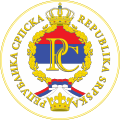National Assembly (Republika Srpska)
National Assembly Народна скупштина Narodna skupština | |
|---|---|
| 11th legislature | |
 | |
| Type | |
| Type | |
| Established | 24 October 1991 |
| Leadership | |
| Structure | |
| Seats | 83 |
 | |
Political groups | Government (47)[1][2]
Supported by (9) Opposition (27) |
Length of term | 4 years |
| Elections | |
Last election | 2 October 2022 |
Next election | 4 October 2026 |
| Meeting place | |
 | |
| Dom Narodne Skupštine 1 Trg Jasenovačkih žrtava Banja Luka | |
| Website | |
| www | |
The National Assembly of Republika Srpska (Serbian Cyrillic: Народна скупштина Републике Српске, romanized: Narodna skupština Republike Srpske, abbr. НСРС/NSRS) is the legislative body of Republika Srpska, one of two entities of Bosnia and Herzegovina. The current assembly is the ninth since the founding of the entity.
History
[edit]The National Assembly of Republika Srpska was founded on 24 October 1991 as the Assembly of the Serb People of Bosnia and Herzegovina, with its administrative seat in Sarajevo. Due to the Bosnian War, the seat was moved to Pale, where it remained until 1998, when it was moved to Banja Luka, its current location.[3] From 1991 to 1996, the Assembly was composed of Serb representatives elected in 1990 for the Assembly of the Socialist Republic of Bosnia and Herzegovina, most of them members of the Serb Democratic Party (SDS).[4] By the time when the Constitution of Republika Srpska was promulged in February 1992, the Assembly was made of 72 seats for the SDS, 4 for the Union of Reform Forces of Yugoslavia (SRSJ) and one for the Serbian Renewal Movement (SPO).[5] The first parliamentary bloc formally opposed to nationalist forces came into scene in 1994 with the Independent Members of Parliament Caucus (IMPC), a splinter of the SRSJ led by Milorad Dodik.[6]
- First Assembly (24 October 1991 to 14 September 1996)
- Second Assembly (19 October 1996 to 27 December 1997) (election of 4 September 1996)
- Third Assembly (27 December 1997 to 19 October 1998) (election of 14 September 1997)
- Fourth Assembly (19 October 1998 to 16 December 2000) (election of 13 September 1998)
- Fifth Assembly (16 December 2000 to 28 November 2002) (election of 11 September 2000)
- Sixth Assembly (28 November 2002 to 9 November 2006) (election of 5 October 2002)
- Seventh Assembly (9 November 2006 to 15 November 2010) (election of 1 October 2006)
- Eighth Assembly (15 November 2010 to 24 November 2014) (election of 3 October 2010)
- Ninth Assembly (24 November 2014 to 19 November 2018) (election of 12 October 2014)
- Tenth Assembly (19 November 2018 to 15 November 2022) (election of 7 October 2018)
- Eleventh Assembly (15 November 2022 to present) (election of 2 October 2022)
Current composition
[edit]| Party | Votes | % | Seats | |||
|---|---|---|---|---|---|---|
| Direct | Comp. | Total | +/– | |||
| SNSD | 221,549 | 34.64 | 27 | 2 | 29 | +1 |
| SDS | 95,640 | 14.95 | 13 | 0 | 13 | +3 |
| PDP | 65,861 | 10.30 | 6 | 2 | 8 | –1 |
| SP | 37,881 | 5.92 | 5 | 0 | 5 | –2 |
| State Movement[a] | 36,652 | 5.73 | 3 | 2 | 5 | New |
| DEMOS | 34,896 | 5.46 | 3 | 2 | 5 | New |
| US | 32,696 | 5.11 | 3 | 1 | 4 | +1 |
| ZPR | 31,551 | 4.93 | 2 | 2 | 4 | New |
| DNS | 28,503 | 4.46 | 0 | 4 | 4 | –8 |
| Source: Central Election Committee | ||||||
See also
[edit]References
[edit]- ^ "The Republika Srpska National Assembly elects the new Government". 22 December 2022.
- ^ "Radovan Višković ponovo predesnik Vlade Republike Srpske - Region - Dnevni list Danas". 21 December 2022.
- ^ The National Assembly of Republika Srpska.
- ^ Filipovic, Miroslav (24 October 2023). "На данашњи дан прије 32 године основана Народна скупштина Републике Српске". НСРС (in Serbian). Retrieved 25 October 2023.
- ^ Filipovic, Miroslav (28 February 2016). "Чубриловић о годишњици Устава: Српску је сачувало јединство њених представника". НСРС (in Serbian). Retrieved 25 October 2023.
- ^ Stojarová, Vera; Emerson, Peter (2013). Party Politics in the Western Balkans. Routledge. pp. 12–13, 30–31, 40, 47, 88–98, 193. ISBN 978-1-135-23585-7.
External links
[edit]- "About National Assembly". The National Assembly of the Republic of Srpska. 28 January 2015. Retrieved 21 May 2015.
- "National Assembly of the Republic of Srpska".
